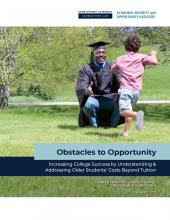Found 6 resources.
0
0
0

Higher education offers millions of people the opportunity to improve their financial well-being. However, higher education is prohibitively expensive and can saddle people with insurmountable debt. Costs beyond tuition—such as housing, food, child care, and transportation—are large, essential components of the cost of attending college for students. In order to better understand how these living costs add up and vary, this report offers estimates of costs beyond tuition for older students between the ages of 25 – 45, who make up roughly one-third of college students and face unique barriers...
Topics: Attendance, Community development, Education, Housing, Post-secondary, Stability, Workforce development
 Shared by Housing Is
on May 20, 2021
Shared by Housing Is
on May 20, 2021 0
0
0
Colleges support students with advising, counseling, or coaching in academics and other skills they need to succeed in school. Some colleges enhance those services through reduced adviser caseloads and more comprehensive, frequent guidance, which can improve students’ semester-to-semester retention and average credits earned. This overview describes important lessons on designing and implementing those services. College leaders and administrators committed to designing, building, managing, and continually supporting enhanced advising services can consult this checklist of recommendations as...
Topics: Attendance, Child welfare, Community development, Education, Grade-level proficiency, Post-secondary, Workforce development
 Shared by Housing Is
on Mar 4, 2021
Shared by Housing Is
on Mar 4, 2021 0
0
0
The nation’s community colleges play a central role in producing a more educated workforce and promoting social mobility. They serve about 40 percent of all college students and, not surprisingly, they serve a disproportionate number of low-income and underrepresented students. But most students who enter these colleges do not graduate — only about a third of entering students earn a degree or certificate within six years.
Among the many programs that have attempted to increase graduation rates, one program stands out. Developed by the City University of New York (CUNY), the Accelerated...
Topics: Attendance, Education, Post-secondary, School-readiness, Workforce development
 Shared by Housing Is
on Oct 6, 2020
Shared by Housing Is
on Oct 6, 2020 0
0
0

Community colleges graduation rates remain low. Some studies have shown that students who enroll in summer courses are more likely to stay on track and graduate, yet despite these benefits most college students do not attend during the summer.
So why don’t students attend, and how can colleges encourage more of them to enroll in the summer? To answer these questions MDRC launched the Encouraging Additional Summer Enrollment — or EASE — project in partnership with the Ohio Association of Community Colleges and 10 community colleges in Ohio. MDRC designed, implemented, and tested two...
Topics: Attendance, Education, Post-secondary, School-readiness, Workforce development
 Shared by Housing Is
on Oct 6, 2020
Shared by Housing Is
on Oct 6, 2020 0
0
0
The King County Housing Authority (KCHA), in partnership with the Highline School District and the nonprofit social service organization Neighborhood House, launched the Student and Family Stability Initiative (SFSI) pilot program in 2013 to provide housing and employment supports to homeless and unstably housed families with children enrolled in Highline elementary schools. In 2016, KCHA contracted with the Urban Institute (Urban) to conduct a process and outcome evaluation of the program’s first three pilot years. This evaluation documents how SFSI works, who it serves, and how well it...
Topics: Attendance, Dual-generation, Education, Family engagement, Housing, Low-income, Pacific Northwest, Partnerships, Place-based, Research, Stability, Workforce development, Youth
0
1
1
The Council of Large Public Housing Authorities (CLPHA) hosted The Housing Is Summit in Washington, D.C., on May 3-4, 2018 with 300 partners across the housing, education, and healthcare sectors. Access video recordings of the Summit's keynote speakers (HUD Secretary Ben Carson, John Bridgeland, Matthew Morton), plenary panels (on topics that cut across sectors like anchor institutions, data collaboration, stability, and foundation investments), and select breakout sessions focused on the intersections of housing, education, and health.
Topics: Affordable Care Act, Attendance, Child welfare, CLPHA, Community development, Data sharing, Dual-eligibles, Dual-generation, Early childhood, Education, Funding, Grade-level proficiency, Health, Healthy homes, Homelessness, Housing, Legislation & Policy, Low-income, Medicaid / Medicare, Mental health, Metrics, MTW, Out-of-school time, Partnerships, Place-based, Preventative care, Racial inequalities, Research, School-readiness, Seniors, Stability, Substance abuse, Supportive housing, Sustainability, TA, Workforce development, Youth
 Shared by Steve Lucas
on May 23, 2018
Shared by Steve Lucas
on May 23, 2018 